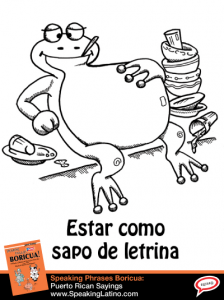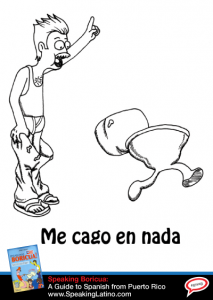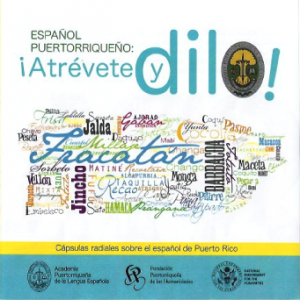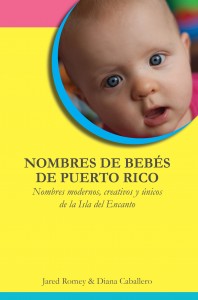If you happen to visit Puerto Rico, you surely will try some of the local food. And at some point, I guarantee that you will overeat mofongo, rice and beans or one of the many fried foods. At that point you will need a local phrase to express how you feel, and that phrase is: […]
ME CAGO EN NA: Puerto Rican Spanish Slang Expression
The Puerto Rican Spanish slang expression me cago en ná (pronounced me ca we ná) is one of the most common swear phrases you will hear from the mouths of locals. Me cago en ná is the colloquial pronunciation of me cago en nada and it’s a mild expression that means “dam!” or “shit!” Puerto […]
Puerto Rican Spanish: RIVERSA or REVERSA?
Take a look at the photo of this sign I took recently in Puerto Rico that reads NO ESTACIONE EN RIVERSA. Instead of riversa the correct Spanish word should be reversa. The use of the word riversa is a good example that shows two characteristics of the Puerto Rican Spanish: 1. The use of words […]
Cool Puerto Rican Spanish Lesson: Audios and Videos of 18 Common Words
For my fellow brothers and sisters from Puerto Rico that want to learn more about our unique vocabulary, and the others who are wondering what are those goofy words we use sometimes, here is a cool sample of some of our common Spanish words. The following Puerto Rican Spanish audio clips are from a radio […]
Nombres de Bebés de Puerto Rico: Nombres modernos, creativos y únicos de la Isla del Encanto
Esta es la introducción del libro Nombres de bebés de Puerto Rico: Nombres modernos, creativos y únicos de la Isla del Encanto. Nombres de Bebés de Puerto Rico Si visitas o vives en la Isla del Encanto, puede que te hayas dado cuenta de que los nombres de muchos jóvenes no los has escuchado antes. […]
LA MONGA: Puerto Rican Spanish Slang Word for Cold
I spent this past weekend really sick with la monga. Whether you are a Spanish-speaker or not, you might be wondering, What the hell is la monga? Is it contagious? YES. Is it life threatening? NO. La monga or simply monga is the Puerto Rican Spanish slang for a strong cold. According to the Tesoro Lexicográfico […]
Las palabras, como las plumas, se las lleva el viento
A proverbial phrase that translates to 'Words, like feathers, are carried away by the wind.' It means that promises and words are easily said but often forgotten or not followed through. Examples Spanish: 'Me prometiste que me ayudarías con mi proyecto, pero ya veo que las palabras, como las plumas, se las lleva el viento.' […]
Las estrellas inclinan, pero no obligan
This phrase translates to 'The stars incline, they do not oblige'. It is a popular saying in Spanish that means while destiny or fate may influence our lives, they don't determine them completely. We still have the power to make our own choices and change our lives. Examples Spanish: Recuerda, las estrellas inclinan, pero no […]
Las doce, la que tenga a mi novio que no lo goce
A playful phrase used often among girls and women which translates to 'At twelve, whoever has my boyfriend should not enjoy it.' It's typically said in a joking manner to express a kind of territorial claim over a boyfriend, particularly at parties or social gatherings where the boyfriend might be present without them. Examples Spanish: […]
Las desgracias no vienen solas
This phrase translates to 'misfortunes never come singly' in English. It implies that bad things tend to happen all at once or one after another, rather than in isolation. Examples Spanish: Perdió su trabajo, su coche se averió y su novia lo dejó. Como dice el dicho, las desgracias no vienen solas. English: He lost […]
Las cosas se toman según de quien vengan
This phrase translates to 'Things are taken depending on who they come from.' It is used to indicate that the way we perceive actions or words can greatly depend on who they come from. For instance, a comment might be taken as a joke if it comes from a friend, but as an offense if […]
Las cosas se caen por su propio peso
This phrase is used to express the idea that the truth always comes out in the end, or that things have a way of settling themselves naturally. It's similar to the English idiom 'the truth will out' or 'what goes around comes around'. Examples Spanish: No te preocupes por demostrar que tienes razón. Las cosas […]
Las apariencias engañan
The phrase 'Las apariencias engañan' is not actually slang, but a common phrase. It translates to 'appearances can be deceiving' in English, suggesting that things may not always be as they seem. Examples Spanish: Parece una persona amable, pero recuerda que las apariencias engañan. English: He seems like a nice person, but remember that appearances […]
Las aguas siempre vuelven a su nivel
This phrase is used to convey the idea that everything returns to its original state or place. It's often used in the context of relationships, implying that people will eventually find their way back to those who are similar to them in character or status. Examples Spanish: 'Las aguas siempre vuelven a su nivel', dijo […]
Ladrón que roba a ladrón, merece el perdón
This phrase is not exactly slang, but a popular saying in Spanish. It literally translates to 'A thief who steals from another thief deserves forgiveness'. It is used to express the idea that if a person does wrong to someone who also does wrong, the action can be justified or is less severe. Examples Spanish: […]
La venganza nunca es buena, mata el alma y la envenena
This is a proverb that translates to 'Revenge is never good, it kills the soul and poisons it.' It is used to express the idea that seeking revenge only leads to more harm than good, fostering negativity and bitterness. Examples Spanish: Después de lo que hizo, entiendo que estés enfadado, pero recuerda que 'La venganza […]
La última la paga el diablo
A Spanish slang phrase that is used to express that the last person or thing to arrive is responsible for a certain task or consequence. It is often used in social settings, such as when a group of friends is ordering drinks, the person who orders last might have to pay for all of them. […]
La tercera es la vencida
This phrase literally translates to 'the third one is the charmed.' It is used to express the belief that the third attempt at doing something will be successful, after two unsuccessful attempts. Similar to the English saying 'third time's the charm.' Examples Spanish: He fallado dos veces al intentar hacer una tarta, pero la tercera […]
La suerte de la fea la bonita la desea
A popular Spanish phrase that translates to 'The luck of the ugly woman is something the beautiful woman desires.' It implies that physical beauty doesn't guarantee happiness or good fortune, and those considered less attractive may have qualities or luck that those considered beautiful may envy. Examples Spanish: Ana siempre consigue los mejores trabajos y […]
La soga rompe por lo más delgado
This phrase is equivalent to the English saying 'the straw that broke the camel's back.' It is used to express that the weakest part is the first to break or give way under pressure, often used in situations where a small or seemingly insignificant issue is the final test of patience or endurance. Examples Spanish: […]
Los trapos sucios se lavan en casa
This phrase literally translates to 'dirty clothes are washed at home'. It is used to imply that family issues or personal problems should be dealt with privately and not discussed or aired in public. Examples Spanish: No deberías haber comentado nada sobre nuestra pelea en la fiesta. Recuerda que los trapos sucios se lavan en […]
La práctica hace el maestro
The phrase 'La práctica hace al maestro' is a Spanish slang that translates to 'Practice makes the master.' This phrase means that by repeatedly doing something, one can become an expert or master in that area. Examples Spanish: Si quieres ser un buen músico, debes recordar que 'la práctica hace al maestro'. English: If you […]
La mujer es como el espejo, si se toca mucho se empaña
This phrase is not exactly a slang but a colloquial metaphor. It literally translates to 'a woman is like a mirror, if it is touched too much it fogs up'. It's often used to imply that if a woman is given too much attention or is overly pursued, she might lose interest or her appeal […]
La luna no es de queso ni se come con melao
A Spanish idiomatic expression that means 'things are not as easy or ideal as they seem.' It's often used to express skepticism towards too good to be true situations or unrealistic expectations. Examples Spanish: No te dejes engañar por su oferta de empleo, la luna no es de queso ni se come con melao. English: […]
La ley entra por la casa
This is a Spanish proverb which translates to 'The law enters the house'. It is used to express that rules or laws must be respected and followed, starting from one's own home. Examples Spanish: Los niños deben aprender desde pequeños que 'la ley entra por la casa', es decir, deben aprender a respetar las normas […]
La ley de Dios no tiene trampa
A phrase that literally translates to 'God's law has no trap.' It is used to express that there's no way to cheat or outsmart God's will or the natural laws of life. Examples Spanish: Por más que intentes evitar tus responsabilidades, la ley de Dios no tiene trampa. English: No matter how much you try […]
La lengua es arma de doble filo
A phrase used to express that words can be both beneficial and detrimental, similar to the English idiom 'A double-edged sword'. Examples Spanish: Ten cuidado con lo que dices, la lengua es arma de doble filo. English: Be careful with what you say, words are a double-edged sword.
La ignorancia es atrevida
This phrase literally translates to 'ignorance is daring' and is used to highlight when someone speaks or acts confidently about something they know little or nothing about. Examples Spanish: Juan siempre habla de política como si fuera un experto, pero nunca ha leído un libro sobre el tema. La ignorancia es atrevida. English: Juan always […]
La gota que colmó la copa
The phrase literally translates to 'the drop that overflowed the cup', and is equivalent to the English phrase 'the straw that broke the camel's back'. It is used to express the final event in a series of actions or occurrences that causes one's patience, tolerance, or good will to be exhausted. Examples Spanish: Después de […]
La gallina vieja da buen caldo
This Spanish slang literally translates to 'The old hen gives a good broth'. It is used to express that experience and wisdom often come with age, and that older people can provide good advice or have valuable skills because of their life experiences. Examples Spanish: No subestimes a tu abuela, recuerda que 'la gallina vieja […]





